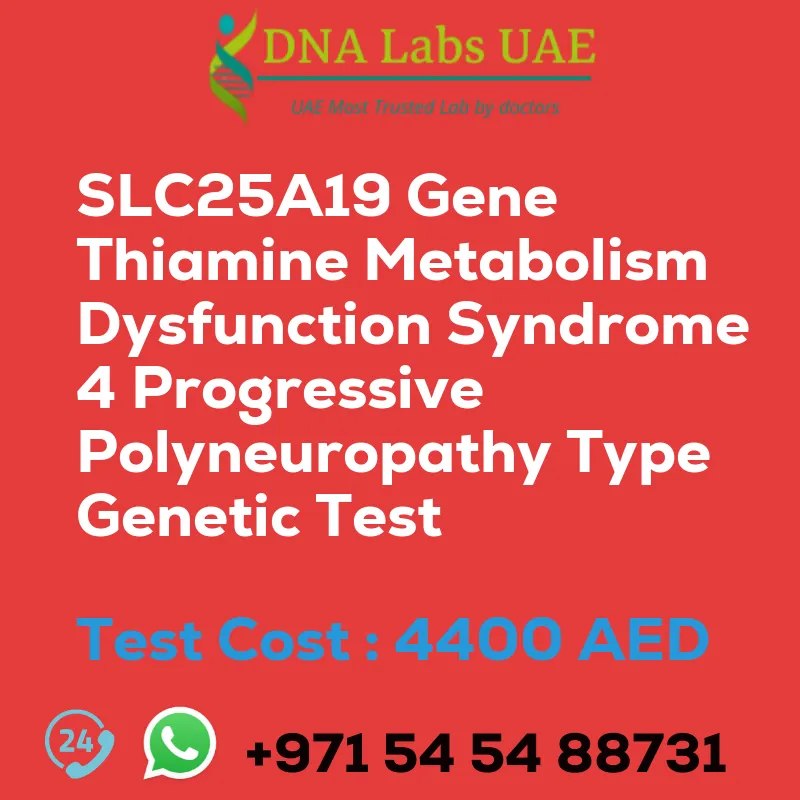SLC25A19 Gene Thiamine Metabolism Dysfunction Syndrome 4 Progressive Polyneuropathy Type Genetic Test
The SLC25A19 gene is associated with Thiamine Metabolism Dysfunction Syndrome 4 (TMDS4), also known as Progressive Polyneuropathy Type (PPN). This genetic disorder affects the body’s ability to process thiamine (vitamin B1), leading to a deficiency in this essential nutrient.
NGS Genetic Testing, which stands for Next-Generation Sequencing Genetic Testing, is a method used to analyze multiple genes simultaneously. It allows for the detection of genetic variations, including mutations, deletions, or insertions, that may be associated with certain disorders or conditions. In the context of TMDS4 PPN, NGS Genetic Testing can be used to analyze the SLC25A19 gene for any mutations or variations that may be causing the thiamine metabolism dysfunction. This can help in diagnosing the condition and guiding appropriate treatment options.
It’s important to consult with a healthcare professional or a genetic counselor to discuss the specific details of the genetic test, including its purpose, benefits, limitations, and potential implications. They can provide personalized information and guidance based on your individual circumstances.
Test Details
- Test Name: SLC25A19 Gene Thiamine Metabolism Dysfunction Syndrome 4 Progressive Polyneuropathy Type Genetic Test
- Components: Blood or Extracted DNA or One drop Blood on FTA Card
- Price: 4400.0 AED
- Sample Condition: Blood or Extracted DNA or One drop Blood on FTA Card
- Report Delivery: 3 to 4 Weeks
- Method: NGS Technology
- Test Type: Neurological Disorders
- Doctor: Neurologist
- Test Department: Genetics
- Pre Test Information: Clinical History of Patient who is going for SLC25A19 Gene Thiamine Metabolism Dysfunction Syndrome 4 Progressive Polyneuropathy Type NGS Genetic DNA Test. A Genetic Counselling session to draw a pedigree chart of family members affected with SLC25A19 Gene Thiamine metabolism dysfunction syndrome 4 progressive polyneuropathy type.
| Test Name | SLC25A19 Gene Thiamine metabolism dysfunction syndrome 4 progressive polyneuropathy type Genetic Test |
|---|---|
| Components | |
| Price | 4400.0 AED |
| Sample Condition | Blood or Extracted DNA or One drop Blood on FTA Card o |
| Report Delivery | 3 to 4 Weeks |
| Method | NGS Technology |
| Test type | Neurological Disorders |
| Doctor | Neurologist |
| Test Department: | Genetics |
| Pre Test Information | Clinical History of Patient who is going for SLC25A19 Gene Thiamine metabolism dysfunction syndrome 4 progressive polyneuropathy type NGS Genetic DNA Test A Genetic Counselling session to draw a pedigree chart of family members affected with SLC25A19 Gene Thiamine metabolism dysfunction syndrome 4 progressive polyneuropathy type |
| Test Details |
The SLC25A19 gene is associated with Thiamine Metabolism Dysfunction Syndrome 4 (TMDS4), also known as Progressive Polyneuropathy Type (PPN). This genetic disorder affects the body’s ability to process thiamine (vitamin B1), leading to a deficiency in this essential nutrient. NGS Genetic Testing, which stands for Next-Generation Sequencing Genetic Testing, is a method used to analyze multiple genes simultaneously. It allows for the detection of genetic variations, including mutations, deletions, or insertions, that may be associated with certain disorders or conditions. In the context of TMDS4 PPN, NGS Genetic Testing can be used to analyze the SLC25A19 gene for any mutations or variations that may be causing the thiamine metabolism dysfunction. This can help in diagnosing the condition and guiding appropriate treatment options. It’s important to consult with a healthcare professional or a genetic counselor to discuss the specific details of the genetic test, including its purpose, benefits, limitations, and potential implications. They can provide personalized information and guidance based on your individual circumstances. |








